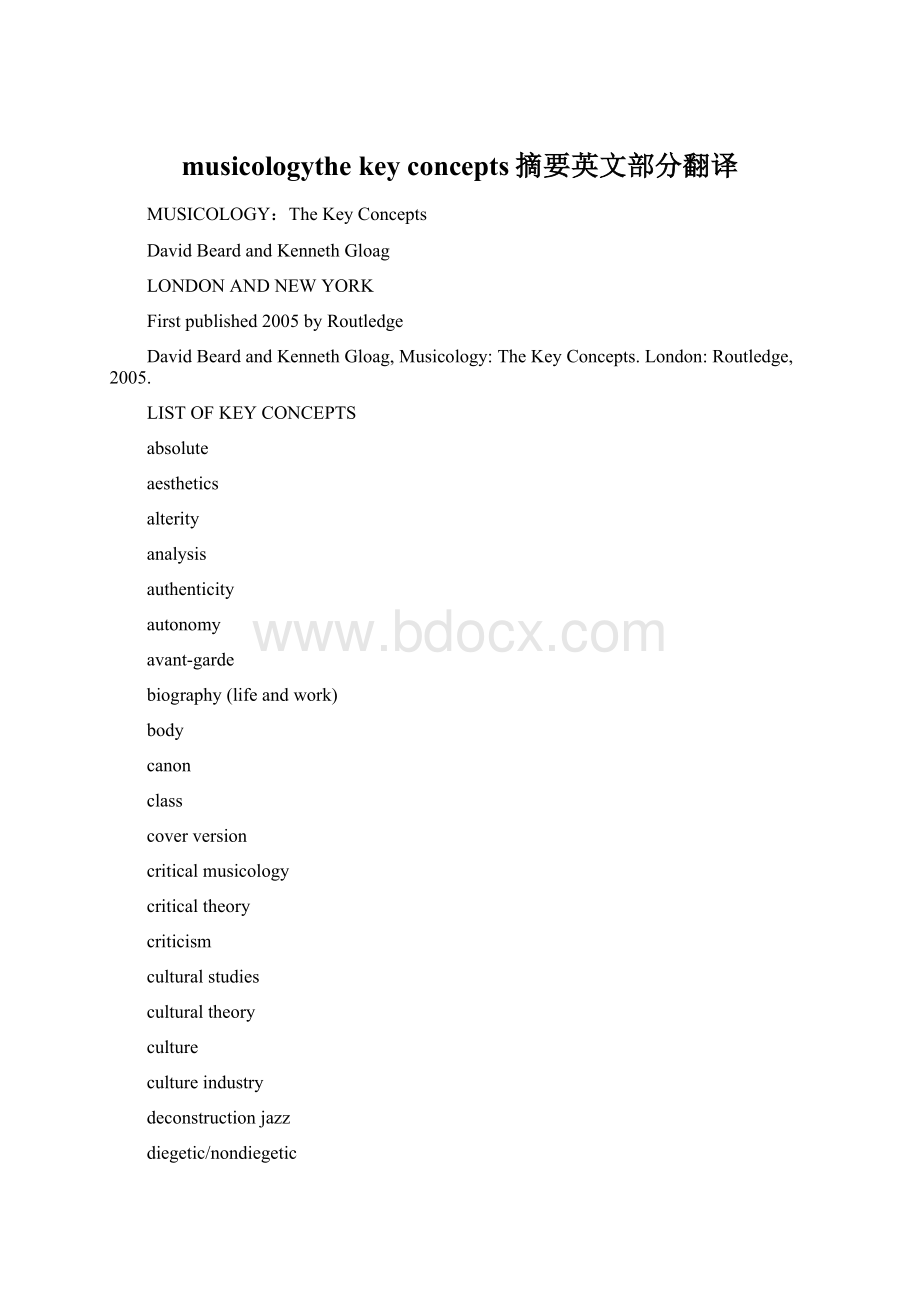musicologythe key concepts摘要英文部分翻译文档格式.docx
《musicologythe key concepts摘要英文部分翻译文档格式.docx》由会员分享,可在线阅读,更多相关《musicologythe key concepts摘要英文部分翻译文档格式.docx(86页珍藏版)》请在冰豆网上搜索。

coverversion
criticalmusicology
criticaltheory
criticism
culturalstudies
culturaltheory
culture
cultureindustry
deconstructionjazz
diegetic/nondiegetic
discourse
Enlightenment
ethnicity
ethnomusicology
expressionism
feminism
form
formalism
gaymusicology
gender
genius
genre
globalization
hermeneutics
history
historical
historicism
historiography
hybridity
identity
ideology
influence
interpretation
intertextuality
landscape
language
literarytheory
Marxism
meaning
metaphor
modernism
music/musicologyIntroduction
musicology
narrative
nationalism
neoclassicism
newmusicology
organicism
orientalism
performance
periodization
place
politics
popularmusic
positivism
post-colonial/postcolonialism
postmodernism
post-structuralism
psychology
race
reception
recording
Renaissance
rhetoric
Romanticism
semiotics
serialism
sexuality
Sketch
structuralism
style
subjectivity
subjectposition
sublime
theory
tradition
value
work
CULTURALSTUDIES
Thetermculturalstudiescanbeunderstoodasageneralizationthatembracesallaspects
TheKeyConcepts33
ofthestudyofculture,includingmusic.However,althoughitisclearlysurroundedby
multiplemeaningsandcontexts,ithasadistinctlineageandisoftenrelatedtoquite
specificpracticesandtheories.Thepointoforiginisgenerallygivenastheworkof
RaymondWilliams,oneofthemostimportantandimaginativewritersonculture,and
RichardHoggart.TheformationoftheBirminghamCentreforContemporaryCulturein
1964,directedbyRichardHoggartandthenStuartHall,representsthebeginningsof
culturalstudiesasanacademicdisciplineandtheincreasinglyrigoroustheorizationof
culture.ThetheoreticalworkthatemergedfromBirminghamembracedamulti-(orinter-
)disciplinaryforceandengagedwithadiverserangeofculturalpractices,factorsthatare
nowcentraltomostversionsofculturalstudies.
Culturalstudieshaveoftenbeenconcernedwithpopularculture(seepopularmusic),
thedistinctionbetweendifferentformationsorlevelsofculturebeingarecurrentissue.
Thisfocusonthepopularhasoftentakenapoliticaldimensionthroughengagementwith
issuessuchasclass.ThesetendenciesarewellarticulatedinDickHebdige’sSubculture:
TheMeaningofStyle(Hebdige1979),aworkthatisfirmlyintheBirminghamcultural
studiestradition.Hebdigeisconcernedwiththeaspirationofyoungpeoplefor
emancipationfromtherealitiesofevery-daylife.Thisleadstoconsiderationofthe
identityofyouthsubculturesandtheoppositionbetweenthisaspirationandthe
commoditystatusandpressuresofthewiderculturalandeconomiccontexts.Essentially
Hebdigeconstructsadialecticalresolutionofthisopposition,bringingthesetensions
togetherthroughthefocusonstyle,whichbecomesasiteofinterplaybetweendifferent
conflicting,competingpressures.Theseissuesaresituatedinthepopularmusicofthe
period,withreferencesmadetostylessuchasglam,reggaeandpunk.
Someofthemostinsightfulworkonpopularmusic/culturetoemergefroman
explicitlyculturalstudiesbackgroundcomesfromAmericanculturaltheoristLawrence
Grossberg,whoviewspopularmusicwithinbroadculturalcontextsand,often,through
politicalandideologicalperspectives(seeideology).Intheintroductiontoacollection
ofessaystiltedDancinginSpiteofMyself(Grossberg1997a),Grossbergsituateshis
‘project’‘betweenaninterestinthesocialeffectsandlogicsofpopularculture,especially
rockmusicandyouthculture,andacommitmenttothepossibilitiesofculturalstudiesas
aformofprogressiveintellectualwork’(ibid.,1).ThissituationleadsGrossbergto
summarizehisworkthrough‘fourtrajectories’:
‘aconcernwiththespecificpracticeof
culturalstudies;
aphilosophicalinterestinculturalandcommunicationtheory;
an
explorationofthepopularityandeffectivityofrockmusic;
andaninvestigationintothe
apparentsuccessofthenewconservativehegemony’(ibid.,1).These‘trajectories’
outlinesomeimportantareasand,inmanyways,canstillbeinterpretedasanagendafor
thefuturemappingofculturalstudiesandpopularmusic.Thefinaltrajectory,the‘new
conservativehegemony’,remindsusthatmusicasaculturalpracticeexistsinpolitical
contextsandlocations,bothofwhichareformedbywhatGrossbergperceivesasthe
dominantpoliticalandculturalclimateofAmericaatthetimeofwriting.
Althoughculturalstudiesmayrelatemostdirectlytopopularmusic,manyrecent
trendsinmusicology,throughanew-foundinterdisciplinarityprovidesometelling
parallels(seenewmusicology).TextssuchasGaryTomlinson’sMusicinRenaissance
Magic(Tomlinson1993b),SusanMcClary’sFeminineEndings(McClary1991)and
JohnShepherd’sMusicasSocialText(Shepherd1991),whilenotalwaysengagedwith
Musicology34
specifictraditionsandagendasofculturalstudies,remindus,inmanydifferentways,that
musicisaculturalpracticeandexistsinandthroughculturalcontexts.
Furtherreading:
During1993;
Grossberg1993,1997b;
Inglis1993;
Mulhern2000
CULTURALTHEORY
seecriticaltheory,culturalstudies,culture
CULTURE
AccordingtotheinfluentialculturaltheoristRaymondWilliams,culture‘isoneofthe
twoorthreemostcomplicatedwordsintheEnglishlanguage’(Williams1988,87).
WilliamsmadethisstatementinabooktitledKeywords,itselfanimportantculturaltext.
ThecomplicationssuggestedbyWilliamsemergefromthedifferentcontextsinwhich
thewordisusedandthedifferentmeaningsthatattachtoit.Whileculturehasgenerally
beenusedasanall-embracingtermforcreative,educationalandartisticactivities,Terry
Eagletonstressesthephysicalityofthetermanditsrelationshipwithnature:
‘thoughitis
fashionablethesedaystoseenatureasaderivativeofculture,culture,etymologically
speaking,isaconceptderivedfromnature’.Followingfurtherconsiderationofearlier
usages,heconcludes:
‘Wederiveourwordforthefinestofhumanactivitiesfromlabour
andagriculture,cropsandcultivation’(Eagleton2000,1).This‘cultivation’conveysan
imageofdevelopmentandgrowth,termsdescriptiveofnaturebutwhichrelatetohuman
activity,specificallyeducation.Thisunderstandingofculturehasaclearapplicabilityto
bothmusicandmusicology,bothofwhichareinextricablylinkedtoeducational
processesandcontexts.
Cultureisoftenthoughtofasbothacontextandasetofpracticesthatdefinethat
context.Thesuggestionofcontextindicatesthatcultureexistsasacollectivepractice.
ThisviewwasprojectedbyT.S.Eliotinatexttitled‘NotesTowardstheDefinitionof
Culture’,inwhichEliotexploredtheinterrelationshipsofthreelevelsofculture:
the
individual,groupsorclasses(seeclass),andthewholeofsociety.Eachoftheselevels
dependsonthenextandresultsinanunderstandingofcultureas‘thewholewayof
life’(Eliot1975,297).Eliot’sperspective,whichwasdrivenbyhisownreligiousbeliefs,
raisescertainfundamentalissues.Clearly,anyindividualassertsidentitythroughhisor
herculturalassociations,and,socialand/oreconomicallydefinedgroupingsmayalso
formidentitiesthroughsharedinterestsandissues,buthowallthiscanbesubsumed
withinaculturaltotalitythatisthe‘wholeofsociety’remainsproblematic.Itisnotable
thatEliotusesthesingularratherthantheplural(theratherthanadefinitionofculture).
Fromourcontemporarymulticulturalperspective(seeethnicity),Eliot’sdefinitionsof
cultureseemsomewhatoutdated,buteveninthecontextofEliot’sowntimetherewere
issuesofdiversityanddifference(seealterity)thatwouldformaresistancetohis
interpretationofculture.
RaymondWilliamscontinuallyproducedinsightfuldiscussionsofcultureanditsstudy
(seeculturalstudies),andhealsoengagedwithEliot’s‘wholewayoflife’,comingto
TheKeyConcepts35
quitedifferentconclusions(Williams1958).Williamstalksofcultureasafluidprocess
andtheneedto‘recognizenotonly“stages”and“variations”buttheinternaldynamic
relationsofanyactualprocess’(Williams1977,121).Thisrelationshipbetweenchange
(‘stages’and‘variations’)andtheinternaldynamicleadsWilliamstostatethat:
Wehavecertainlystilltospeakofthe‘dominant’andthe‘effective’,andin
thesesensesofthehegemonic.Butwefindthatwehavealsotospeak,and
indeedwithfurtherdifferentiationofeach,ofthe‘residual’andthe‘emergent’,
whichinanyrealprocess,andatanymomentintheprocess,aresignificant
bothinthemselvesandinwhattheyrevealofthecharacteristicsofthe
‘dominant’.
(ibid.,121–2)
Theseterms(dominant,residual,emergent)areimportantforWilliams,andthey
purposefullyreflectthedynamicnatureofcultureasprocess.‘Residual’relatestopast
cultures:
‘By“residual”Imeansomethingverydifferentfromthe“archaic”….Any
cultureincludesavailableelementsofitspast,buttheirplaceinthecontemporarycultural
processisprofoundlyvariable’.Clearly,anycultureorculturalcontexthasapast,an
inheritance,buthowthatisreconstructedinthepresentisopentochange(is‘variable’).
ThisresidualculturecoexistswithwhatWilliamsterms‘emergent’culturalpra